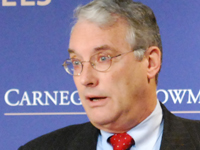Registration
You will receive an email confirming your registration.
IMGXYZ1228IMGZYXThe economic crisis, the urgent need for global action on climate change, and a nonproliferation regime under critical strain, combined with a U.S. administration that pledged to renew America’s approach to the world, have created a moment of major transition in foreign policy. This transition underscores two vital points: that the United States cannot confront these problems alone, and that a longer-term, visionary approach to foreign policy is needed—even in the midst of a crisis—to understand the next major challenges before they overwhelm us.
With that longer-term outlook in mind, the 4th annual Carnegie Junior Fellows Conference examined the role of emerging powers in climate change, nonproliferation, and the global economic system, and how the United States can engage them effectively to address these pressing issues.
“Between chaos and functional multi-polarity”
Thomas Fingar, chairman of the National Intelligence Council until December 2008 and now Payne Distinguished Lecturer at Stanford, opened the conference with a keynote address examining the rise of Brazil, Russia, India and China in historical context and looking ahead to the next decade. By 2025, new players will not only have a seat at the table—their involvement will change the stakes and rules of the game.
Key points from the opening keynote:
The “rise of the rest” is best understood as a multi-wave process. It began with the revival of Europe and Japan after World War II, continued through the rise of the East Asian tigers, and brought Brazil, Russia, India and China (the BRICs) to prominence today. Candidates likely to be in the next wave include Turkey, Indonesia, and Iran.
The international system is in uncharted territory as it transitions toward multi-polarity. The United States is not in decline, but the gap between the United States and other powers is narrowing. In addition, all of the postwar institutions—the IMF, the World Bank, the UN, NATO—will likely lose much of their effectiveness by 2025 unless they are revitalized or re-engineered. The old order is fraying, and no one has put forth an alternative.
Effective engagement with emerging powers will require strong U.S. leadership. This is especially true if, as seems likely, the current system is insufficiently equipped to handle the dramatic action needed to address climate change and the global economic crisis. Emerging powers benefit from the status quo that enabled their rise; any restructuring imaginable will require more burden-sharing
The current wave of rising powers is particularly likely to transform the system for several reasons. One is the sheer size—in terms of population, resource endowment, and landmass—of India and China. Russia and China were also U.S. adversaries in the recent past, and India and Brazil, as advocates of nonalignment and non-interference, place heavier emphasis on strict respect for sovereignty than the current international order does.
Other highlights from the conference:
Climate Change
Panelists: Taiya Smith (Carnegie), David Pumphrey (CSIS), Bo Kong (SAIS)
- Ensuring success at Copenhagen will require all countries to commit to emissions-reduction targets. But bilateral agreements, particularly those regarding the transfer of clean technologies, will also play an important role in achieving global progress.
- Securing a reliable energy supply at a cost that allows continued economic growth is the top consideration on climate change for most developing countries, especially China, which is on track to become the largest energy consumer by 2015.
- Unless non-OECD countries switch to a low-carbon development path, it will be impossible to prevent carbon emissions from exceeding the tipping point beyond which catastrophic change is inevitable. This will require incorporating the cost of emissions into energy prices.
- The next global climate agreement will have to address deforestation, where tensions between developed and developing countries are especially sharp. Brazil and Indonesia will be key players.
Global Economics
Panelists: Uri Dadush (Carnegie), José Ocampo (Columbia University), Eduardo Zepeda (Carnegie)
- The G20 is likely to become a key economic policy decision-making forum.
- China, India, and Brazil will emerge stronger from the crisis. Russia, whose overreliance on its energy resources magnified the effects of the crisis, will be weakened.
- Divisions among emerging powers run deep. A strong coalition of developing countries that included India and China could counterbalance the West’s economic weight—but such a coalition is unlikely to emerge anytime soon.
- China’s overtures to Africa have borne fruit: Africa votes with China on most issues at the UN. China is working hard to build other regional coalitions, and could gather support for its proposed alternate reserve currency that would compete with the dollar.
Nonproliferation
Panelists: Linton Brooks (Former Administrator, National Nuclear Security Administration), Achilles Zaluar (Embassy of Brazil), Henry Sokolski (Nonproliferation Policy Education Center), George Perkovich (Carnegie)
- The 2010 NPT review conference must restore the credibility of the NPT regime by recommitting nuclear weapon states to disarmament, reducing direct proliferation threats such as Iran and North Korea, and preserving the availability of appropriately safeguarded nuclear energy.
- The least important result of the review conference is a final document; what is critical is a concrete perception that the regime’s three pillars are being reinforced equally.
- Inadequate enforcement in the nonproliferation regime is symptomatic of a larger global problem of policing. The United States cannot and should not be the world’s enforcer. International coalitions must be built outside the NPT regime for enforcement to be successful.
- It appears that economic considerations are playing an important role in Russia’s political calculations about Iran. The international community's responses to the proliferation threat posed by Iran demonstrate that economic and political considerations may trump security concerns.
